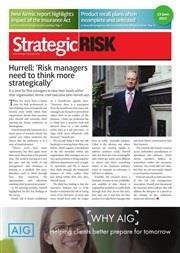Ahead of the leadership debate at the Airmic conference, we asked some of the panellists what they consider to be the main issues facing the industry

“The cost base is still too high with far too many processes still manual requiring multiple handling. Profitability [in the industry] is just being maintained, but only by luck (with no significant cat losses) and releasing reserves from the balance sheet. Rates continue to fall because of increased capital which continues to flow in while other investments are producing poor returns.
“Mergers continue, but with a few notable exceptions capacity of merged organisations is not always equal to the pre-merged entities which reduces overall capacity, and in my view this is detrimental in the long term for large limit purchases.
“There is too little development of existing products, even well-established lines - such as property - struggle with the technological advances when it comes to how valuations should be established given that few items of machinery over five years old would ever be replaced on a like for like basis, and for IT equipment the obsolescence is far shorter.
“I do not see anyone addressing this. It is a negotiation at the time of a claim which leads to uncertainty. Other lines are not developing as fast as needed by businesses. As an example, organisations face significant exposure from nondamage BI and whilst I can appreciate the need to underwrite carefully, sticking plaster solutions [on the problem] does not represent true development.
“Cyber appears to have been developed without consulting clients and in early days offered low limits, it is an example of a product that has not taken off as insurers hoped, probably because it does not yet meet the needs. It is an area where the landscape changes quickly and a static product will be obsolete very quickly.”
Paul Goulding, head of insurance, Heathrow Airport Limited
“With too many players operating in a low growth environment, the industry faces the risk of a race to the bottom on rates, a risk that is accelerated by changing distribution models and new technology.
“But where there is risk, there is opportunity. Innovative insurance solutions like cyber, intellectual property rights or reputation, to name a few. We are addressing needs of our customers, attracting new talent to our industry and helping accelerate growth.”
Vincent Vandendael, chief commercial officer, Lloyd’s of London
“The biggest challenge we face is waving goodbye to much that has served us well in the past and embracing tools and practices that will enable us to stay relevant to today’s environment and in particular to ever evolving client needs.
“It’s understandable that much of our time is spent trying to make a profit in a low interest, highly competitive environment; however at some point soon we must wake up to the reality that the business models that have served us so well in the past need a complete overhaul.
“That means investing in the right type of talent, understanding and utilising technological advances in data, analysis and artificial intelligence, and a willingness to pool our resource, knowledge and expertise with both clients and brokers to enter a partnership where the whole is greater than the sum of its parts. I believe that we have started down this path but there’s still a long and difficult journey ahead.”
Mark Platten, chief underwriting officer, AXA Corporate Solutions
“Insurance is a very mature industry. Most firms in the UK that need insurance have it and most of what they buy are well-established policies. That risks making insurance a commodity, where buyers’ choice becomes more limited even as the supply of capacity remains plentiful, but with continued competition among brokers and insurers.
“At the same time the value of insurance can become limited if it simply smooths cash flow for firms’ lower level losses – rather than providing critical cover in the event of an existential crisis – or if it simply transfers risk to an insurer rather than enable firms to manage it.
“Taken together, it doesn’t surprise me that some insurers are concerned about their relevance and profitability. It’s a particular challenge for the London market, given growing local capacity in many major geographies.
“The very positive thing for the industry is that risk has never been more relevant as a board-level topic. We need to reach up to that agenda with powerful solutions to the challenges boards face. That means extracting insights from insurance about how to manage risk intelligently and address firms’ most pressing challenges. These include threats to their continuity, how to use insurance as an efficient source of financing or as an opportunity to differentiate themselves to their own customers.
“At Marsh, we’ve tried to shape our agenda for clients around those themes. We’ve led thinking on cyber risk, extracting insights from insurance to shine light on how well the risk is being managed; we’ve helped FTSE100 firms use insurance guarantees as an efficient way to solve for pension deficits; we’ve just helped set up an aircraft financing solution for Boeing that provides an alternative path for airlines to fund their fleet purchasing. Innovations like this are our way of making sure that insurance, and the wider risk and finance solutions it enables, are addressing the big issues facing our clients. At the same time, we are working with carriers to ensure that the insurance solutions that meet our clients’ particular needs are as powerful and responsive as possible.”
Mark Weil, chief executive, Marsh UK & Ireland




















No comments yet